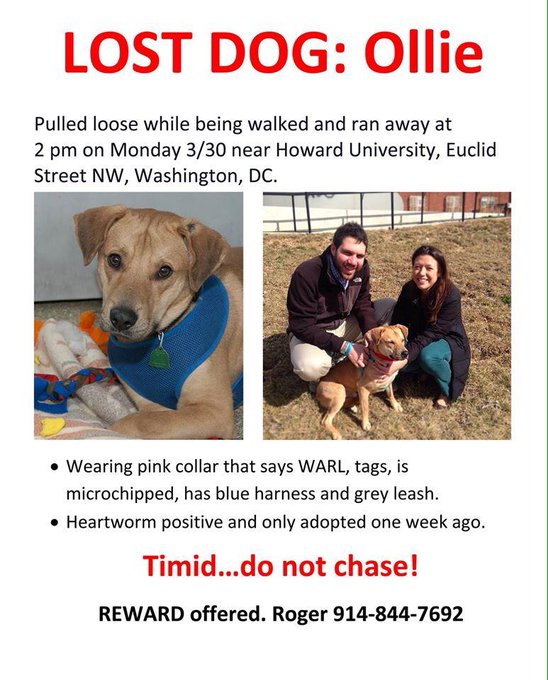United States News
See other United States News Articles
Title: Cops Threaten Dog Owner With $750,000 Fine Over ‘Missing Dog’ Posters
Source:
Infowars
URL Source: http://www.infowars.com/d-c-cops-th ... fine-over-missing-dog-posters/
Published: Apr 13, 2015
Author: Kit Daniels
Post Date: 2015-04-15 21:18:06 by Deckard
Keywords: None
Views: 1610
Comments: 3
After losing his dog Ollie on March 30, Roger Horowitz was initially encouraged by police to post ‘Lost Dog’ posters on lamp posts, but a police officer recently told him to tear them all down. “So he told me that regardless if we put up the fliers, or if other people put them up, we had made the original flier that had my phone number, and that we could get fined up to $750,000,” he said to NBC Washington. The D.C. municipal code does in fact regulate ‘Missing Dog’ posters, despite the First Amendment. “No person shall affix a sign, advertisement, or poster to any public lamppost or appurtenances of a lamppost, except as provided in accordance with this section,” Chapter 24, Section 108.1 of the D.C. Municipal Regulations reads. The “exceptions” are strict to say the least: the poster must be registered with the city, each copy must contain the date posted and there can be no more than three posters per each side of the street per block. So in other words, if you have a missing dog in Washington, D.C., you better beg the government for permission to search for him. This totalitarianism isn’t unique to D.C., however. California Polytechnic State University-Pomona was also requiring students to apply for a ‘free speech permit’ if they wanted to hand out flyers on campus. “Cal Poly Pomona’s campus policies impose a web of restrictions before students can distribute literature on campus: They must check in with the Office of Student Life, allow the school to copy their IDs, and wear badges signed by an administrator,” reported the Foundation for Individual Rights in Education, who is helping Tomas sue the school. “Even then, would-be speakers are relegated to the so-called ‘free speech zone.’” “Badges can only be issued from 8 a.m. to 5 p.m. on weekdays, although the Office of Student Life pledges to ‘work with’ any student who wishes to engage in expressive activity on evenings or weekends.”
Washington, D.C., police threatened a dog owner with a $750,000 fine for posting ‘Missing Dog’ posters across town.

Post Comment Private Reply Ignore Thread
Top • Page Up • Full Thread • Page Down • Bottom/Latest
#1. To: Deckard (#0)
(Edited)
Are we supposed to piss our pants over the wideranging jackbootery of the capitol? And it was a violation of city lamp posts only. They were free to put their posters elsewhere. It's a stupid article. Screw these people who can't handle a tiny dog on a leash. And their little dog Toto too.
Stray 'Mama Cat' has had three litters of kittens Last week I saw one of the offspring running through the Hopefully it was a mole. But it wasn't the right color.
What an idiotic conclusion and statement by this articles writter. Trailer park journalism.
Every society gets the kind of criminal it deserves. What is equally true is that every community gets the kind of law enforcement it insists on. Robert Kennedy
#2. To: Deckard (#0)
over the past three years. It never ends.
back yard with a small gray mammal in it's mouth.
Could have been a mouse - could have been a baby gray
squirrel that fell out of the nest. We've got a lot of them.
Moles are darker in color. Damn things are wrecking the lawn.
#3. To: Deckard (#0)
So in other words, if you have a missing dog in Washington, D.C., you better beg the government for permission to search for him.
Top • Page Up • Full Thread • Page Down • Bottom/Latest
[Home] [Headlines] [Latest Articles] [Latest Comments] [Post] [Mail] [Sign-in] [Setup] [Help] [Register]
